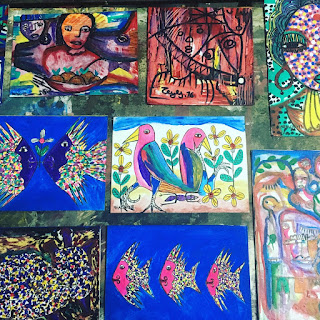Why I Choose to Embarrass Myself Every Day by Trying to Speak Xitswa
“Gicile,” I exclaim while waving my hand and smiling softly.
A roar of laughter accompanied by slaps on the thigh and big toothy grins
“Gicile, wo yini ka vuka?,” my neighbor asks.
“Ndzi vukile kwatsi, wena ke?,” I reply.
“Minawo vukile kwatsi, kanimambo,” she says.
“Kanimambo,” I thank her.
Interactions like this one have been such a gift to me in the last two weeks while visiting my site where I’ll be living for two years. Picking up on the local language of Xitswa has proven to be quite a challenge lately, especially because it is being taught to me in Portuguese, a language that I am barely able to grasp as it is.
I could count on my fingers how many phrases I know in Xitswa and it can be confusing to be constantly surrounded by a language that I don’t understand, especially when I know that people are talking to me or about me. Although it’s been an awkward couple of weeks while I’ve tripped over both Portuguese and Xitswa, interactions like the one above remind me that I have so much to learn here in Mozambique.
So why take the time and energy to learn a local language when Portuguese is so widely spoken here? My answer has more to do with principle than it does with practicality. When I arrived in my town for this visit and I started testing the waters with the little Xitswa I knew, I expected for people to laugh at me for poor pronunciation or potentially saying something completely wrong. I expected people to not take me seriously and brush off my attempts to integrate through the use of local language.
Boy, was I wrong.
Yes, people have laughed at me, corrected me, and asked me why I can’t speak Xitswa. But the boisterous laughter has always been warm and kind, the corrections have been helpful, and the questions are fair.
Today someone said something to me that made this all come full circle and thus inspired me to write this post. While on our way to the airport to head back down to Maputo for the last month of training, the driver of our chapa told my friend and I something that I will likely never forget.
“Are the two of you going to learn Xitswa?,” he inquired.
“We’re learning, little by little,” we replied.
“It’s very good to learn the local language here and you should practice when you can.”
“Yes, we’ve noticed that people are always very kind when we try to speak Xitswa and they usually get a good laugh out of it.”
“The people here, they smile and laugh when you speak Xitswa because they love to see people like you trying. You are showing that you value our language. You are showing that you value us. Mozambique has a very sad history. Colonization, war, violence. When everything else changes, we will always carry our languages with us.”
Someone once told me that when the Portuguese came to Mozambique, they enforced the use of their language by deeming local languages the “lingua dos caes” or “language of dogs.” They made it seem as though the Portuguese language was superior, smarter, and more valuable even though there is nothing within any language that makes it inherently better. Why does this matter now that Mozambique is an independent country? I think it matters because all around the world, local languages are dying and cultures along with them. Globalization is a constant threat to the individuality of language and local customs. While Portuguese remains the national language of Mozambique, it serves mostly a unitary purpose—to unite the country through having one uniform language. I think the reason why our friend, the chapa driver, said what he said was because trying to learn Xitswa is more than learning a new language. It’s acknowledging, appreciating, and honoring a culture that survived oppressive colonization and ridicule.
I will always be so quick to remind myself in times of frustration with cultural differences here that Mozambique is a place of astonishing resiliency and transformation. Such strong preservation of local language is a clear testament to that.
That is why I will continue to embarrass myself by trying to speak Xitswa.
With love,
Emily
My views and opinions are my own and do not reflect those of the United States government or Peace Corps organization.




Comments
Post a Comment